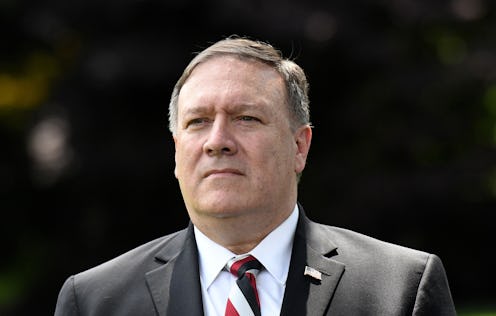News
North Korea & The U.S. Are Squabbling Over What Is And Isn't "Gangster-Like"

Despite Trump's claims that North Korea is no longer a threat following his summit with the country's leader Kim Jong Un, there is still much to be hammered out between the country and the United States. And the ongoing talks to work out the complicated details don't seem to be going all that well if you look at the recent language used by the North. North Korea and Mike Pompeo's "gangster-like" language is a sign things might not be going so well — even though the Trump official first said they were.
Pompeo had spent days in North Korea trying to further the denuclearization agreement. Before leaving Pyongyang on Saturday, the Secretary of State said "a great deal of progress" was made.
But then, just after Pompeo left, the North came out with a statement attacking the talks, calling the U.S.'s demands "gangster-like." The North's foreign ministry's statement, which was put out by Korean Central News Agency, also called Pompeo's visit "regrettable."
It didn't take long for Pompeo to talk back. "If those requests were gangster-like, the world is a gangster," Pompeo said on Sunday, noting that many U.N. Security Council resolutions have made the same requests. "People are going to make certain comments after meetings. If I paid attention to the press, I’d go nuts and I refuse to do that."
The Secretary of State tried once again to paint the meetings in a positive light, but that might be a bit harder with the North making such a contradictory statement. "The road ahead will be difficult and challenging and we know critics will try to minimize what we have achieved," Pompeo conceded Sunday.
That comes closer to acknowledging what the North's position on the talks was. Their statement read, “We had expected that the U.S. side would offer constructive measures that would help build trust based on the spirit of the leaders’ summit ... we were also thinking about providing reciprocal measures."
"However, the attitude and stance the United States showed in the first high-level meeting (between the countries) was no doubt regrettable," it continued. "Our expectations and hopes were so naive it could be called foolish." The talk made a point, though, of not criticizing president Trump. They wrote, "We wholly maintain our trust toward President Trump."
Pompeo said that current sanctions will remain in place, even though his version of the talks are much rosier. "While we are encouraged by the progress of these talks, progress alone does not justify the easing of the sanctions regime," Pompeo said. "Sanctions will remain in place until final fully verified denuclearization as agreed to by Chairman Kim Jong Un has occurred."
One concrete thing that Pompeo had hoped to achieve on this trip was the return of the remains of American soldiers from the Korean War. That has also been postponed to later in July and will be handled by the Defense Department. Trump has talked in ways that suggest the remains have already been returned, but that is not the case.
Pompeo tried to talk directly towards Kim, much as the Koreans had done with Trump. "I am determined to achieve the commitment that President Trump made, and I'm counting on chairman Kim to be determined to follow through on the commitment that he made," Pompeo added on Sunday.
Whether the two sides can get past this "gangster-like" argument remains to be seen, but Trump is betting on it. He declared the problem solved on Twitter just after the summit. "There is no longer a Nuclear Threat from North Korea," he wrote.
That might have been a bit premature.